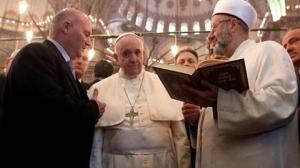By Ashley Repp
News Desk Reporter, Middle East
Istanbul, Turkey–
As the situation in the Middle East becomes ever more dire, Pope Francis traveled to Turkey to discuss Isil, refugees, Christian expulsion, Islamiphobia, and the reunification of the Catholic and Orthodox churches.

In a display of humility, mutual respect, and the understanding of the grave situation of Syrian and Iraqi refugees, many of whom are Christians, Bartholomew I, Patriarch of the Orthodox Church, and Pope Francis, jointly condemned the violence that has escalated in the Middle East. The Middle East has traditionally been home to Christians since the birth of the religion more than 2,000 years ago. In recent decades, renewed persecution of Christians has forced many to leave their homes and settle in Western countries. For example, just since 2003, the Christian population in Iraq has fallen by 70%.
Thousands of Christians have been forced to flee as Isil tightens its grip on the region. Remaining in Syria and Iraq means risking likely death and persecution for religious beliefs. Fleeing offers refugees not only a chance for survival, but a chance to continue to practice their religious faith. Jordan and Turkey have become refuges for those escaping the fundamental Sunni Islam imposed under Isil. But the burden of so many refugees will begin to weigh more heavily on those countries hosting them, which is likely to exacerbate issues in an already relatively unstable Middle East.
Pope Francis addressed the issue of fundamentalism, the primary reason religious minorities have been forced to flee their homes, during his trip to Turkey. He called for an end to fundamentalism and its devastating effects that take a serious toll on the lives it touches. Now, Pope Francis asserted, more than ever is the time for interfaith dialogue, respect, and friendship. He also urged that military intervention is not the way to end fundamentalism and extremism; rather, addressing the needs of the impoverished and starving is the most viable way to end fundamentalism. Pope Francis urged that addressing the needs of those most in need is not simply applicable to the Middle East, but to the world as a whole.
The joint efforts by the Bartholomew I and Pope Francis suggest a desire to establish closer ties between the Eastern and Western wings of Christianity. These efforts, as well as closer ties between the two churches, may enable Christian leaders to better handle the persecution of Christians in the Middle East, particularly under Isil.
For more information, please visit:
The Telegraph- Pope and Patriarch condemn expulsion of Christians from the Middle East- 30 Nov, 2014
The Guardian- Pope and Patriarch condemn Middle East persecution of Christians– 30 Nov, 2014
Reuters- Pope condemns ‘barbaric violence’ of Islamic State– 28 Nov, 2014
Deutsche Welle- Pope Francis raises alarm over Middle East conflict in Turkey Visit- 28 Nov, 2014